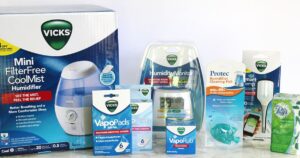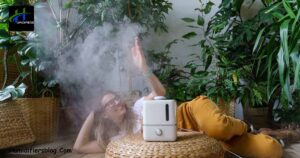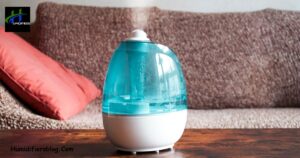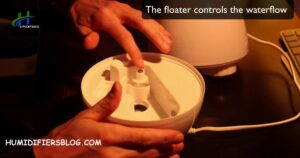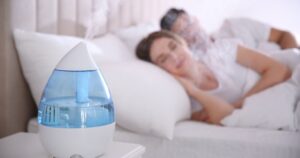Water plays a crucial role in maintaining the optimal functioning of humidifiers. These devices, designed to add moisture to the air, are commonly used to combat dryness in indoor environments.
The water you choose can affect the air quality in your home and even impact your health. Let’s dive into the importance of selecting the right water for your humidifier and explore how it can make a difference in creating a healthier living space.
Choosing the right water for your humidifier goes beyond just preventing mineral buildup. It involves understanding the potential consequences of using tap water or other sources that may contain impurities. In the following paragraphs, we will discuss the types of water suitable for humidifiers and What Water To Use In Humidifier and healthier humidification process.
Why Invest in a Humidifier?
Investing in a humidifier is a smart choice for several reasons. Firstly, it helps maintain a comfortable and healthy indoor environment. Humidifiers add moisture to the air, preventing it from becoming too dry, which is especially beneficial in dry climates when heating systems can dry out the air. This helps reduce the risk of respiratory issues, dry skin, and irritated eyes.
A humidifier can protect your home and belongings. Dry air can cause wood to crack, paint to peel, and musical instruments to go out of tune. By maintaining optimal humidity levels, a humidifier helps preserve the integrity of your furniture, and other valuable items. Investing in a humidifier is a simple yet effective way to enhance your overall well-being and protect your home from the negative effects of dry air.
What Type of Water Should be Used in a Humidifier?
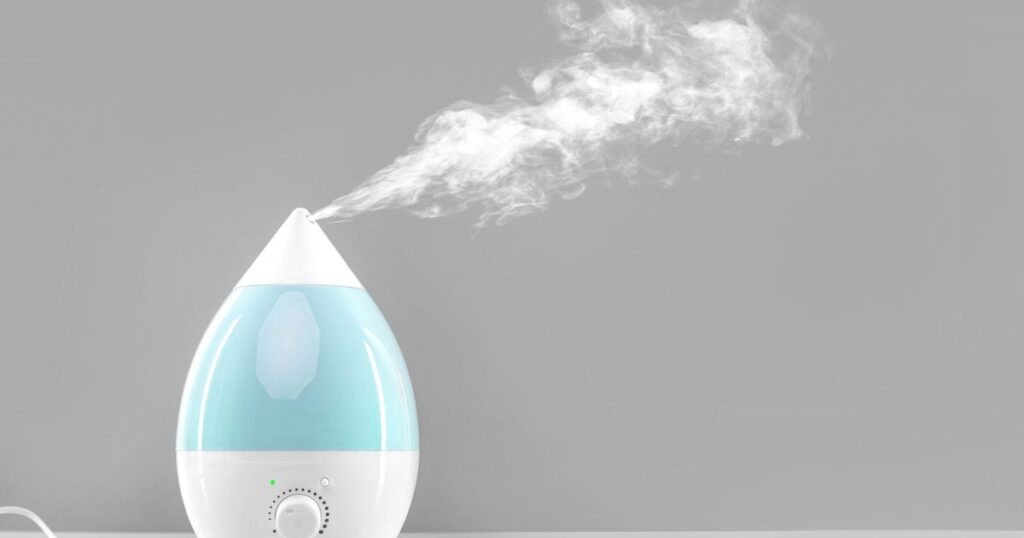
When incorporating a humidifier in your house, it’s crucial to use distilled or demineralized water. These specialized water types are devoid of minerals and impurities, safeguarding your humidifier from potential damage over time. Tap water, commonly containing minerals like calcium and magnesium, can lead to the accumulation of deposits or scale within the humidifier.
Not only does this impact the device’s efficiency, but it may also release minerals into the air, posing a risk of respiratory issues. Choose distilled or demineralized water for your in-house humidifier to ensure optimal performance and promote a healthier indoor environment.
By using distilled or demineralized water, you ensure a cleaner and healthier humidification process. It helps extend the lifespan of your humidifier and prevents the release of harmful particles into the air you breathe. Remember to follow the manufacturer’s recommendations for water type and cleaning to keep your humidifier functioning effectively and to maintain a safe and comfortable indoor environment.
Can I Use Bottled Water in a Humidifier?
Demineralized water from bottles is a good option because these types of water are generally free from minerals and impurities that can lead to scale or deposits in the humidifier.
If you’re using spring water or mineral water, be aware that these may contain minerals that can accumulate in the humidifier over time. This could affect its performance and potentially release minerals into the air, which might not be ideal for respiratory health.
How to safely use a humidifier?
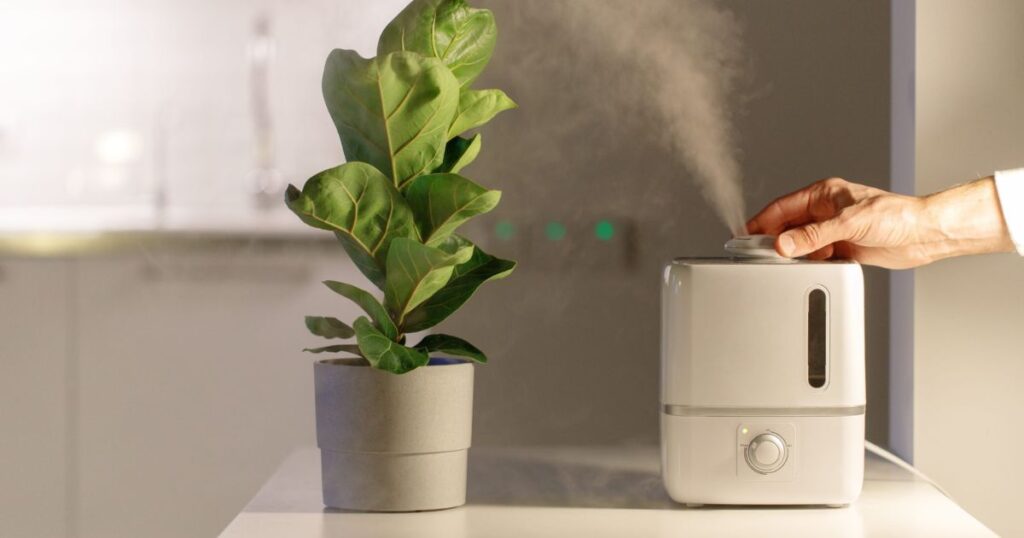
Using a humidifier can be beneficial, but it’s important to use it safely. First, read the manufacturer’s instructions carefully. Each humidifier is different, so understanding how yours works is essential.
Second, clean your humidifier regularly. Mold and bacteria can grow in the water tank, so empty and clean it at least once a week. Use a mixture of vinegar and water for a natural cleaning solution. Also, change the water daily to prevent the buildup of harmful microorganisms.
Manage humidity
To manage humidity effectively, start by using a hygrometer to measure the humidity levels in your home. Ideal indoor humidity ranges between 30% and 50%. If it’s too high, consider using a dehumidifier to remove excess moisture.
During colder months, maintain proper ventilation by using exhaust fans in bathrooms and kitchens. This helps reduce humidity created by activities like showering and cooking.
Use distilled water
It recommended to use distilled water. Distilled water is free from minerals and impurities that can accumulate in the humidifier and be released into the air. Using distilled water helps prevent the formation of white dust, which can settle on surfaces and is a byproduct of minerals in tap water.
Regularly using distilled water also reduces the risk of bacterial and mold growth inside the humidifier. Since distilled water lacks the minerals that promote the growth of these microorganisms, it keeps the humidifier clean and ensures the mist it releases is clean as well.
Keep your machine clean
To keep your machine working well, make sure to clean it regularly. Follow the instructions from the maker to clean it properly. For electronics, like computers, use gentle tools like soft cloths and air spray to remove dust. Don’t use too much water. For kitchen machines, take apart the removable parts and wash them with mild soap. Check for any leftover food or dirt. Let everything dry before putting it back together. Cleaning your machine often helps it last longer and work better.
Replace filters regularly
Remember to replace your filters regularly to keep things running smoothly. Filters in appliances like air purifiers, HVAC systems, or vacuum cleaners play a crucial role in trapping dust and particles. Over time, they can get clogged, reducing efficiency and affecting performance. Check the manufacturer’s recommendations for how often to change the filters.
Keep interior doors open
Keep your interior doors open for better air circulation in your home. Open doors help air flow from room to room, preventing stale and stuffy conditions. This simple practice encourages a more even distribution of heat or cool air throughout your living space. It can also assist in maintaining a consistent humidity level.
How is distilled water treated?
Distilled water goes through a purification process called distillation. This involves boiling water and collecting the steam to remove impurities. The steam then cools and condenses back into pure liquid water, free of minerals and contaminants. Using distilled water in your humidifier prevents mineral buildup inside the machine.
Tap water contains minerals that get left behind as moisture evaporates into the air. Over time, these minerals accumulate and clog humidifier components. Distillation removes these minerals through boiling and steam collection. So fill your humidifier with distilled water to prevent sediment accumulation. Regular cleaning is still needed, but distilled water extends the time between deep cleanings.
Humidifier risks and precautions
| Risks | Precautions |
| Mold and Bacteria Growth | Use distilled water to minimize mineral deposits. |
| Clean and disinfect the humidifier regularly. | |
| Change water daily to prevent microbial growth. | |
| White Dust | Use distilled water to reduce mineral content. |
| Clean the humidifier and filter regularly. | |
| Respiratory Issues | Maintain humidity levels between 30% and 50%. |
| Clean the humidifier to prevent bacterial growth. | |
| Electrical Hazards | Follow manufacturer’s guidelines for safe use. |
| Regularly inspect the power cord and plug for damage. | |
| Tripping Hazards | Place the humidifier in a safe, low-traffic area. |
| Secure cords to prevent tripping. |
Frequently Asked Questions
What is a Humidifier and What Can it Do?
A humidifier is a device that adds moisture to the air, relieving dryness and enhancing indoor comfort.
Can You Use Tap Water in a Humidifier?
It’s not recommended to use tap water in a humidifier as it may contain minerals that can lead to white dust and reduce the device’s efficiency.
What is Distilled Water?
Distilled water is purified water with impurities and minerals removed through a distillation process.
Can You Make Distilled Water for a Humidifier at Home?
Yes, you can make distilled water at home by boiling water and collecting the steam, then condensing it back into liquid form using store-bought distilled water is a simpler and more reliable option for humidifiers.
Final Thoughts
Choosing the right water for your humidifier is essential for its proper functioning. It’s best to avoid using tap water because it can contain minerals that create white dust and may lead to bacterial growth in the humidifier. Opting for distilled water, which is purified and free from impurities, helps maintain a clean and efficient humidification process.
The type of water you use directly impacts the air quality in your home. You not only ensure a healthier environment but also extend the lifespan of your humidifier. This is making the right water choice is a simple step towards creating a more comfortable and hygienic living space.

